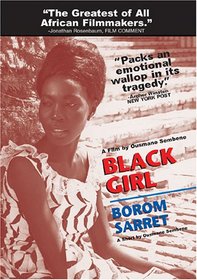| Actors: Ly Abdoulay, Albourah, Mbissine Thérèse Diop, Anne-Marie Jelinek, Robert Fontaine Director: Ousmane Sembene Creators: Christian Lacoste, Ousmane Sembene, André Gaudier, André Zwoboda Genres: Indie & Art House, Drama Sub-Genres: Indie & Art House, Drama Studio: New Yorker Video Format: DVD - Black and White - Closed-captioned DVD Release Date: 11/22/2005 Original Release Date: 01/01/1966 Theatrical Release Date: 01/01/1966 Release Year: 2005 Run Time: 1hr 20min Screens: Black and White Number of Discs: 1 SwapaDVD Credits: 1 Total Copies: 0 Members Wishing: 8 MPAA Rating: Unrated Languages: French, French Subtitles: English |
Search - Black Girl / Borom Sarret on DVD
  | Black Girl / Borom Sarret Actors: Ly Abdoulay, Albourah, Mbissine Thérèse Diop, Anne-Marie Jelinek, Robert Fontaine Director: Ousmane Sembene Genres: Indie & Art House, Drama UR 2005 1hr 20min Diouana (Mbissine Thérèse Diop) is a stranger in a strange land. In Dakar, she was a nanny--a job she found fulfilling--but is forced to leave when her employers, Madame (Anne-Marie Jelinek) and Monsieur (Robert ... more » |
Larger Image |
Movie DetailsSimilar Movies
|
Movie ReviewsExcellent Cinematography and Dialogue Diaspora Chic | Silver Spring, MD | 09/02/2006 (5 out of 5 stars) ""Black Girl" and "Borom Sarret" depict Senegal after independence. "Black Girl" tells the story of Diuoanne, an African, with dreams of going to France to escape her poor neighborhood in Dakar. When she arrives in France, her dreams of the beautiful city Antibes is a nightmare. Madame is a plantation mistress who treats her like property rather than an adult. She finds fault with everything she does. Diouanne is a prisoner in another country with no chance of exploring the city. Feeling deprived of her self-worth, she takes the mask that she has given to them because it is the only thing that reminds her of her homeland. "Borom Sarret" is a story of a family man who earns a living driving a cart. Life is rough where he lives, but he is proud of who he is and where he comes from. On the other side, the city is filled with buildings and cars on the street. It is more modern than where he is living. However, modernity has its price and he sees it for what it is. Both short films portray the optimism and disappointment post-colonial independence for the African people. Sembene gives a riveting picture of intra- and interracial relations; the economic struggle; and social expectations of Africa and Africans. This is a great movie to watch and discuss with among peers as to how it has changed for the better or for the worse." Two tragic tales nadav haber | jerusalem Israel | 04/11/2007 (5 out of 5 stars) "The less horrifying among the two films, "Borom sarret", shows one day in a life of a horse cart driver. He gets into trouble for driving into the white neighborhood, cheated by a wealthy black man who abandons him. This is the story of the powerless masses who were the victims of the European colonizers and their black collaborators, after colonization was officially over. "Black Girl" is the tragic story of a pretty Senegalese woman who discovers the reality of racist exploitation in a most vicious manner. Like the "borom Sarret" cart driver, she is completely powerless, but moving to France takes away the little family protection she had in Senegal. In France, she is a "non-person", and this realisation is too much for her. There are millions of "Black Girls", men and women, who were forced to leave Africa and serve as the tree choppers and water bearers of the West. This ongoing crime is largely unnoticed by the affluent society, who only takes notice when "riots erupt" in the poor slums. Sembene's movies should be given as much exposure as possible, in the hope of waking people up to this modern day slavery." Unforgettable Images in La Noire de... khense | los angeles, CA | 08/14/2006 (5 out of 5 stars) "I saw this film 40 years ago.It still burns in my mind.Diouana, a nice girl from a poor country,wants a better life,which she believes will be"En France." She has only the vaguest idea what's in store for her & does not understand the value of what she leaves behind-including her boyfriend-a nice guy.En France, Diouana's employers mean well, however they eventually have to face that Diouana has given up but cannot go home. Images of a clean bathtub after a suicide, the boyfriend's photo in a suitcase, the child & the mask - will never go away." Great Movies - Two of them Patrick Jackson | St Paul, MN | 10/02/2005 (5 out of 5 stars) "Black Girl is as the previous reviewer described it. Barom Sarret is a different movie from a year before. It is shorter than La Noire De.... It is cruder, but more succinct, and, I believe, superior to Black Girl. Both movies are excellent, and worthy of purchase, that they appear together on one disc is particularly generous."
|





